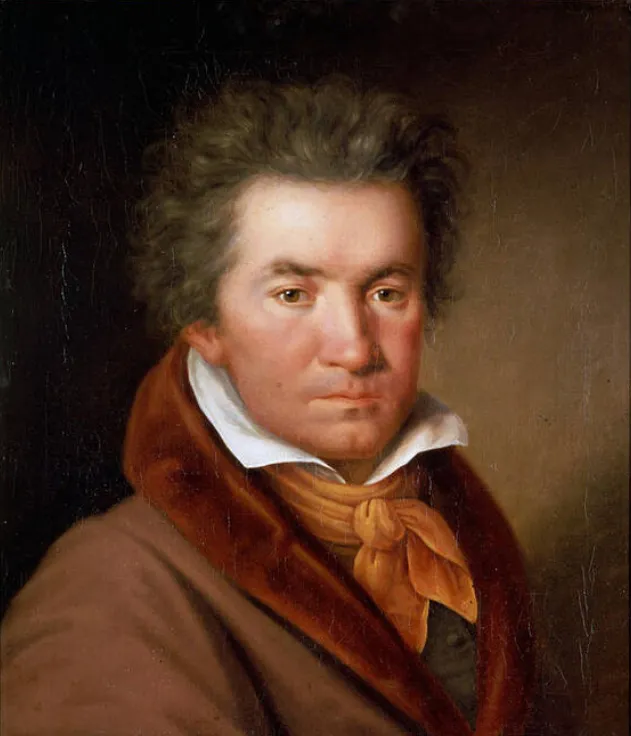Continuing the article from last week (Beethoven’s appearance and personality), this time we focus on his habits and relationships.
Again, the base for this article will be the biography written by Marion Scott, Beethoven. She was an English musicologist, violinist, and advocate for women in music. She drew on historical accounts, letters, and anecdotes to illuminate Beethoven’s character, providing insights that remain influential in Beethoven scholarship.
Personal habits and lifestyle
Beethoven’s personal habits and lifestyle reveal a man whose life was shaped by his intense dedication to music, often at the expense of conventional order and comfort. His daily routines and living conditions were marked by eccentricity, reflecting his singular focus on creative work and a profound connection to nature that fueled his inspiration.
Beethoven’s living spaces were notoriously chaotic, filled with manuscripts, old clothes, dust, and minimal furniture, making visits an “adventure” for guests. Scott describes his rooms as having a “frightful confusion” of items, with wet floors from his habit of pouring water over himself when deep in thought. This peculiar practice -emptying jugs of cold water over his hands or head while composing – was not only a quirk but a testament to his immersion in creative processes, often to the detriment of his surroundings. His bed was described as “of military hardness,” and his furniture was sparse, suggesting a disregard for material comforts.
Despite this chaos, Beethoven was meticulous about certain aspects of his lifestyle. He insisted on light, airy lodgings with pleasant views, avoiding rooms facing inner courtyards, which he considered less healthy in Vienna’s dense urban setting. His frequent changes of residence – sometimes renting multiple lodgings simultaneously -reflect a restlessness that Scott suggests may parallel his musical instinct for variation and development. This mobility, today would be called “nomadic lifestyle”, was often accompanied by disputes with neighbors over various reasons.
Nature was a cornerstone of Beethoven’s life, serving as a wellspring of inspiration. Scott emphasizes his long walks in the countryside, where he spent entire days, even nights, during summer months. These outings were not mere leisure but a vital part of his creative process, as he sketched ideas in notebooks while immersed in the natural world.
Beethoven’s hygiene habits were equally idiosyncratic. He washed thoroughly each morning but was known to pour water over his hands for extended periods when lost in thought, sometimes flooding the rooms below. Shaving was a comprehensive task for him, leading to comical incidents. His irregular eating habits – favoring fish but often skipping meals – contributed to his health issues.
Beethoven’s lifestyle, oscillating between chaos and deliberate choices, portraits a man who prioritized his art above all. His love for nature and disregard for conventional tidiness reveal a personality driven by creative necessity.
Social interactions
Beethoven’s personality was a complex tapestry of contradictions – quick-tempered yet warm-hearted, rebellious yet sensitive, charismatic yet increasingly isolated by his deafness. His social interactions, marked by robust humor and intense emotions, paint a picture of a man who both captivated and alienated those around him.
Scott describes Beethoven as quick in his movements and impatient with slowness, reflecting the urgency of his creative mind. His humor was often crude, and his laughter loud and somewhat frightening, shaped by the lack of modulation in his voice due to deafness. As his hearing deteriorated, he relied on conversation books, where questions were written down, and he often spoke or wrote his replies. These books, Scott notes, are a “pitiful” record of his isolation, capturing the solitude of a man who could no longer hear human voices. Despite his isolation, Beethoven’s charisma made him highly attractive, particularly to women. His rebellious spirit was a source of strength, allowing him to defy his physical limitations.
His social interactions were further complicated by his suspicion, heightened by deafness and Viennese intrigue. Scott notes that friends like Johann Hummel faced his wrath, receiving letters calling them “treacherous dogs” before reconciliations. Yet, Beethoven’s warmth shone through in his friendships with women like Countess Erdödy and Baroness Ertmann.
Scott’s biography captures this duality, portraying him as a man whose genius and flaws were inseparable.
Family dynamics
Beethoven’s relationships, particularly with his family, and close friends, were marked by intense loyalty, generosity, and conflict. His bond with his nephew Karl and his friendships with aristocrats and musicians reveal a man driven by deep emotional needs but often thwarted by his own intensity and circumstances.
The most moving relationship was with Karl, Beethoven’s nephew, whom he treated as a son. After his brother Kaspar’s death in 1815, Beethoven fought for custody of Karl, believing he could provide a better upbringing than Karl’s mother, whom he disparaged as the “Queen of Night.” His love for Karl was all-consuming, yet possessive, leading to heartbreak. Scott quotes letters where Beethoven pleads with Karl to return home, fearing for his safety, and expresses anguish over Karl’s perceived deceit: “God is my witness that I dream only of you, of my wretched brother, and of the joy of having nothing more to do with this deceiving, abominable family foisted on me.” These letters reveal a desperate paternal affection that often backfired, as Karl resisted Beethoven’s moralizing. This struggle culminated in Karl’s attempted suicide in 1826, a devastating blow to Beethoven that likely hastened his decline .
Beethoven’s family ties were fraught. He venerated his grandfather, maintained a protective silence about his father Johann’s flaws, and held tender memories of his mother. His relationships with his brothers, Kaspar and Johann, were strained; he called Johann his “pseudo-brother” and used derogatory nicknames like “Fettlümmerl” (Little Fat Lump) for Johann’s wife. Once he signed his letter to his brother proclaiming himself “Brainowner” in response to Johann’s “Landowner”. Scott suggests Beethoven gave as much provocation as he received.
In contrast, Beethoven’s friendships were a source of strength. He maintained lifelong bonds with the Breuning family, particularly Eleonore and Stephan, whose son Gerhard became a cherished companion. Aristocratic patrons like Prince Lichnowsky, who gifted him valuable instruments, and Archduke Rudolph, supported him despite occasional insults, such as Beethoven calling Lichnowsky an “ass” over a missing bassoonist. His friendships with women, like Countess Erdödy and Nanette Streicher, were often Platonic and deeply empathetic.
In general, his relationships reflect a man of profound loyalty and emotional depth, yet plagued by mistrust and intensity.








